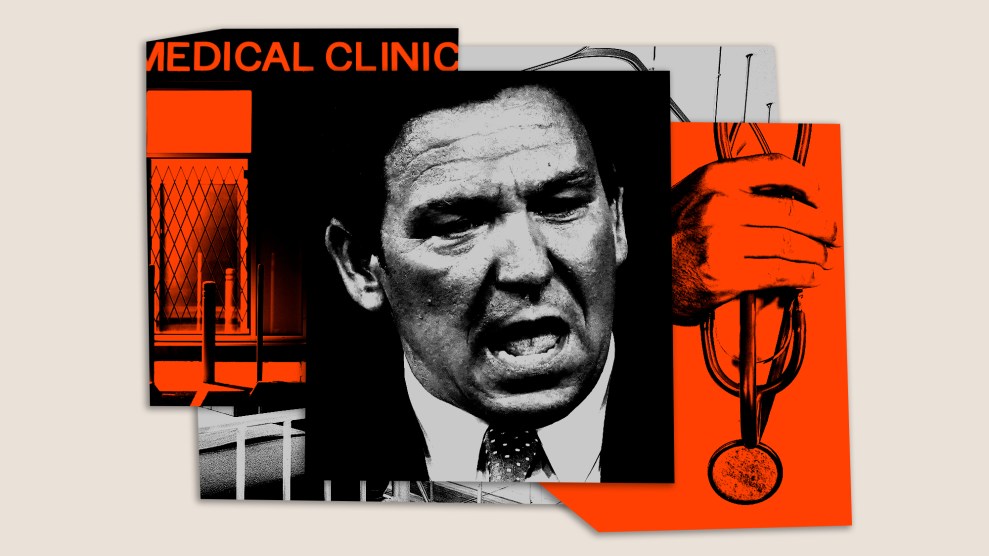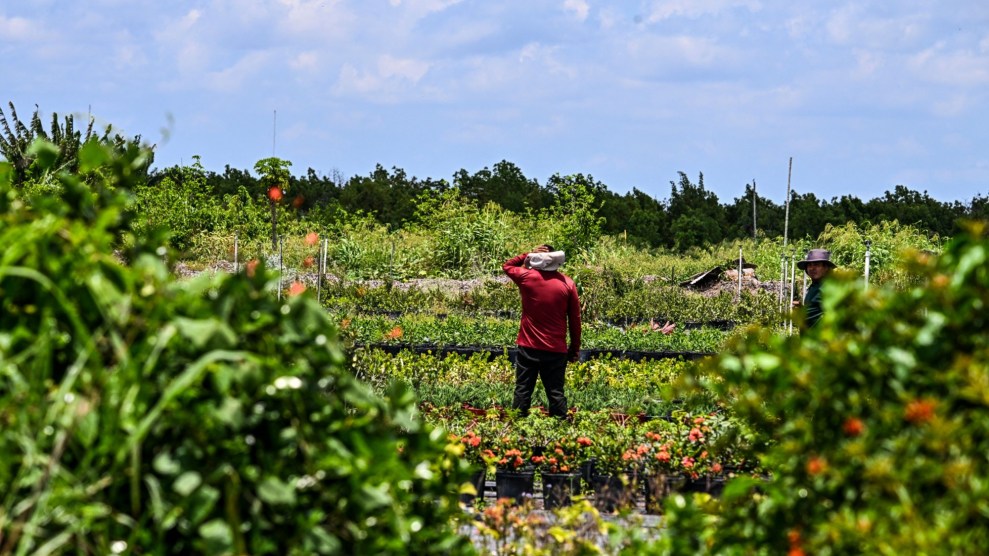
Mother Jones; John Raoux/AP; Unsplash
The patients at Juana Duran’s maternity clinic are terrified. Many are undocumented, and, according to Duran—an administrative staffer at the Florida facility—they are worried that a new law championed by Gov. Ron Desantis could put them at risk of deportation when they give birth. “I know my people,” says Duran. “They are scared.”
At the heart of that fear is Senate Bill 1718, one of the strictest anti-immigration laws in the nation. Signed by DeSantis in May and slated to go into effect on July 1, the legislation places stronger requirements on employers to check immigration statuses of new employees, restricts undocumented immigrants’ access to driver’s licenses, and criminalizes the transportation of undocumented immigrants into the state.
It also brings the GOP’s anti-immigration Crusade into Florida’s hospitals. Under the new law, any hospital that accepts Medicaid will now be required to ask on intake forms if a patient is a US citizen or lawfully present in the country. This mandate follows previous attempts by the state to scrutinize immigrants’ use of health care, including DeSantis’ executive order last year instructing state agencies to track spending on medical care for undocumented patients.
On its face, SB 1718 isn’t intended to be used as a tool to deny care or expel immigrants. The measure instructs hospitals to tell patients that their responses won’t be handed over to immigration officials. Patients can also decline to answer questions about their legal status. Federal law requires hospitals to treat anyone in need of emergency care, regardless of immigration status.
But while these caveats may sound good on paper, health care providers say the details aren’t always clear to vulnerable immigrants in need of treatment. And the damage is already done when people believe it’s too risky to show up for care in the first place.
“We know that a lot of people are already very afraid,” says Alison Yager, executive director of Florida Health Justice Project.
“People who had been in ongoing care and treatments”—or who have chronic conditions or “were seeing providers regularly—have stopped,” she adds. “A significant number have stopped coming to their appointments.”
“The fear is the biggest factor,” says Jennie Joseph, a midwife and founder of the Florida maternity clinic where Duran works. “From the patient’s perspective,” the message people hear is that “they will be in jeopardy if they present in the hospital.”
For some of the law’s supporters, fear is precisely the point. During a community event addressing the implications of SB 1718, Florida State Rep. Rick Roth, a Republican who voted in favor of the bill, emphasized that the legislation is “100 percent supposed to scare you.” GOP State Rep. Alina Garcia echoed this statement, telling the audience that the goal of the bill is “basically to scare people from coming to the state of Florida.”
In this climate of fear, many immigrants are terrified to get any kind of medical care. Joseph’s maternity clinic is not a hospital, but she says that clients are worried about coming in because they believe, mistakenly, that her office is included in the requirement to report immigration status. For others, the fear extends even farther. Some are concerned that getting a ride to their appointments will put the driver at risk. Many are scared to leave the house at all.
The clinic is trying to make patients feel more comfortable seeking care during their pregnancies, including by offering telehealth services and at-home visits for those afraid to travel. But at the end of the day, people are frightened about what will happen when they eventually need to give birth in a hospital. “Will immigration be coming for me right away?” the women ask, according to Duran. “What will happen with my baby?”
When Joseph thinks about how her clinic’s patients will manage in this atmosphere of anxiety, it’s the most vulnerable women she’s especially worried about. Families with more resources can leave the state and obtain care elsewhere, she says. For healthy mothers, who might be able to have home births, things may not be particularly dire. But for mothers with complicated pregnancies, who are stuck at home and too afraid to call for help, the situation is much more chilling. “Just the thought of a hemorrhage…” she trails off. “Like, what are we going to do now?”
Florida’s new mandate comes at a time when many states have moved towards expanding health care for undocumented immigrants—not limiting it. A report by the National Immigration Law Center says that over the past decade, states of varying political stripes have enacted laws to increase access to care for residents regardless of immigration status, especially during the pandemic. According to Tanya Broder, a senior staff attorney at NILC and an author of the report, Florida’s latest rules run counter to these trends.
The importance of immigrants’ health to overall community health is clear. After the Trump Administration issued its “public charge” rule, which penalized people on visa and green card applications for obtaining benefits like SNAP or Medicaid, research showed that many who got sick with Covid declined to seek care due to fears of being labeled a public charge or being reported to immigration authorities. In response to that rule, US Citizenship and Immigration Services emphasized that it’s crucial to ensure immigrants are “not deterred” from programs necessary for health. Many states—including Texas and California—have issued explicit guidance directing health care workers not to ask about immigration status.
“Our health is interconnected,” Broder says. “It’s impossible to target undocumented immigrants without harming citizens and immigrants with status who live in families and communities with each other.”














